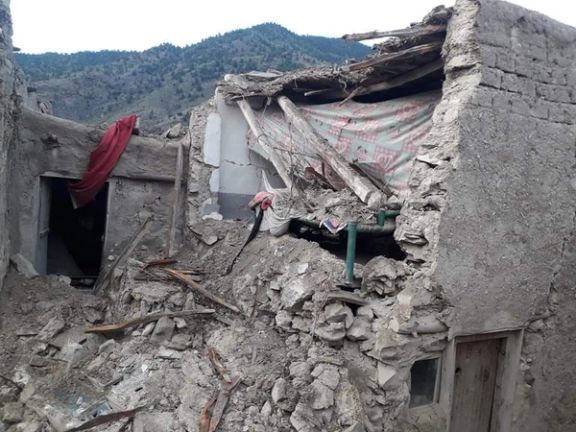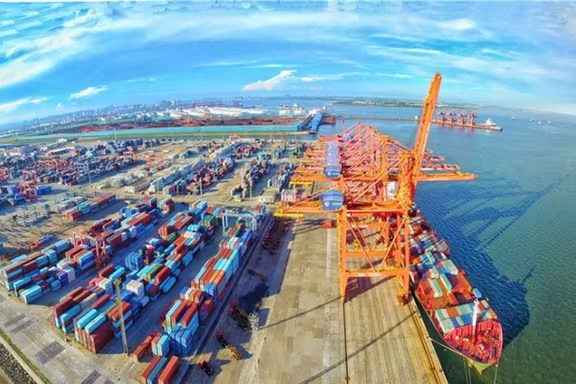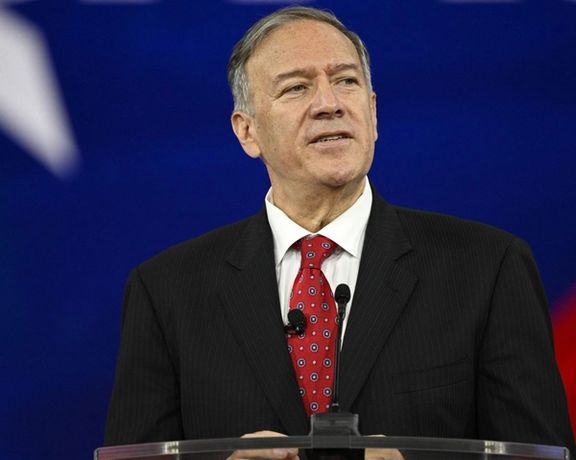Senator Says US Military Ends Up Using Fuel Sourced From Iran

United States Senator Joni Ernst (R-Iowa) has said that there is information the US military is using refined fuel sourced from Iranian crude shipments to Asia.

United States Senator Joni Ernst (R-Iowa) has said that there is information the US military is using refined fuel sourced from Iranian crude shipments to Asia.
Iran International’s congressional correspondent Arash Alaei reported that Sen. Ernst who was speaking at the weekly Senate bi-partisan press conference, mentioned that Iranian and Russian crude oil is refined and indirectly sold to the US military.
After the press conference she told Alaei that the information has come to light “just recently” but did not elaborate how and if the US executive branch is investigating the issue. She added that wording was added to the National Defense Authorization Act apparently to prevent the practice. She mentioned however that the crude is being processed in South Korean and Japanese refineries.
The US has sanctioned Iranian oil and refined fuel exports since the 2018, when former president Donald Trump withdrew from the 2015 nuclear agreement with Iran known as the JCPOA. Third parties are also prohibited from trading in Iranian oil and could be subjected to US sanctions.
Iran International immediately asked for comment from the State Department but so far there has been no response.
Regarding Iranian oil sales to China despite US sanctions, Sen. Ernst said, “certainly we can look at ways to put pressure on China, but it would be very difficult” to stop it.

An earthquake of magnitude 6.1 killed at least 1,000 people in Afghanistan early on Wednesday, leaving over a thousand of others injured while the toll is likely to rise.
According to the US Geological Survey (USGC), the quake struck about 44 kilometers (27 miles) from the city of Khost, near the Pakistani border. Photos and videos from the area showed homes reduced to rubble and bodies covered in blankets on the ground.
The strong jolt was also felt in parts of Pakistan, India and Iran.
Most of the confirmed deaths were in the eastern Afghan province of Paktika, where 255 people had been killed and more than 200 injured, said interior ministry official Salahuddin Ayubi, adding that In Khost province, 25 people had been killed and 90 taken to hospital.
He said the toll will rise as information is trickling in from remote mountain villages, where it will take some time to collect details.
Authorities said a rescue operation has been launched and helicopters have been dispatched to remote areas to carry some of the injured, but locals say people themselves are removing the bodies of the victims from under the rubble in the absence of government and systematic relief teams.
It was the deadliest earthquake since March 2002 that killed a total of 1,100 in the country, which has a long history of earthquakes, many in the mountainous Hindu Kush region bordering Pakistan.
Later in the day, a 5.2-magnitude earthquake also hit an area near the Persian Gulf port city of Bandar Mogham in Iran’s southern province of Hormozgan. No casualties were immediately available.

China has received a new shipment of nearly 2 million barrels of Iranian oil in the past week, according to shipping trackers, with the cargo possibly destined for state reserves.
The 260,000 ton cargo, carried by vessel Dorena which is owned by the National Iranian Tanker Corp (NITC), was discharged at Zhanjiang port, according to shipping tracking specialist Vortexa Analytics as well as US advocacy group United Against Nuclear Iran, which specialises in tracking Iranian oil flows.
A Vortexa analyst told Reuters the cargo was for state reserves. Previous imports of Iranian oil for China's state reserves have also been facilitated by NITC vessels and discharged at Zhanjiang.
The cargo would be the fourth such shipment designated for state reserves since last December and is likely to be reported by Chinese customs which is due to release detailed commodities import data for June next month.
While China has been making sporadic official imports of Iranian oil, its private refineries over the past two years have also been buying large amounts of Iranian oil despite the United States' sanctions on the country's oil exports.
Some reports, however, said that unofficial Chinese imports of Iranian oil declined by as much as 50 percent in May as competition from cheap Russian oil increased.
Volumes of China's Iranian oil purchases, passed off as oil from suppliers such as Malaysia, Oman, Iraq or the United Arab Emirates, make up roughly 7% of China's total crude oil imports.
Most of these supplies were bought by Chinese independent refiners.
Reporting by Reuters

Latest official figures from China show its oil imports from Russia soared, displacing Saudi Arabia as top supplier, while continuing to buy cheap Iranian oil.
Russia shipped 8.42 million tons of oil to China, or about 61.5 million barrels in May, 55 percent higher than a year earlier after many countries stopped buying its crude after the invasion of Ukraine. This amounts to roughly 2 million barrels a day, while Saudi Arabia shipped 7.82 million tons. The figures came from the Chinese General Administration of Customs.
Previously it was reported that Iranian shipments to China had dropped by as much as 50 percent in May due to Russian competition, but the official Chinese figures, which show only a part of imports from Iran, do not indicate a drop, at least in the officially imported crude. Iran shipped 260,000 tons or less than 1.9 million barrels, which is just over 61,000 barrels per day.
But Chinese Customs figures do not reflect the full picture of Iranian oil imports, because of United States third-party sanctions, which could penalize companies buying Iranian crude. Most of Iran’s shipments go through Malaysia and are imported as such. Iranian tankers have been transferring their cargo to other tankers in Asian waters that carry it to China as oil coming from other countries.
Russia, Iran and Venezuela offer steep discounts to China, which despite less demand because of the COVID pandemic and a slowing economy, prefers to replace other supplies with oil from those sanctioned countries. As a result, more supplies from the Middle East and Africa will be freed up for countries that do not buy Russian oil. As of May, the extra Russian oil China bought amounted to around million barrels a day compared with 2021.
But any reduction of Iranian exports to China will have a serious impact on the finances of the government in Tehran that has embarked on eliminating subsidies, in a tricky and risky political balancing act.
In early May, it eliminated a food import subsidy that cost between $9-15 billion a year depending on whose figures one considers. Iranian officials are notorious for announcing widely different and sometimes contradictory economic data.
Next in line seems to be a reduction in huge fuel price subsidies. The elimination of these subsidies is impoverishing a low-paid population, fueling almost non-stop protests. The government promised cash assistance to low-income people in lieu of eliminating subsidies, but this would need oil income. Otherwise, the government must keep printing money with the risk of inflation becoming triple digit.
The government has a clear choice of reaching an agreement with the United States to restore the 2015 nuclear deal known as the JCPOA, which would lift crippling sanctions on Iran’s oil exports and international banking, but apparently it has been counting on illicit oil sales to China as a way of muddling through. In the meantime, it has accelerated it nuclear program, either to build more leverage in the talks or to actually achieve the status of a nuclear threshold country.

Former US Secretary of State Mike Pompeo says President Joe Biden has thrown out stability in the Middle East by negotiating to make a new nuclear deal with Iran.
Pompeo told Fox News on Sunday, "The stability that we had built during our four years has now just been squandered and thrown away. They’re putting us all at risk."
While the Biden administration is hoping to “appease” Iran, it is possible that the Iranians could shut down the Strait of Hormuz and drive energy prices even higher, he said while enumerating challenges currently facing the administration ahead of Biden’s visit to Saudi Arabia, which is reportedly aimed at reducing skyrocketing gas prices and confront Iran’s nuclear weapons program.
Pompeo criticized Biden’s energy policy to fill the need for more oil and gas in the market from foreign sources, saying that instead of energy producers within the US, “they started with the Iranians and the Venezuelans and now have moved to the Saudis.” “American energy is the right place to start”, he added
"When you side with the Iranians, when you side with the world’s largest state sponsor of terrorism, against Israel, and against Saudi Arabia, and against the Emirates, the leaders of those countries no longer have confidence in the United States, and the chance that they’re going to do a solid for Joe Biden is exceedingly low," he said.

Germany has expelled an Iranian cleric who was the deputy head of the Islamic Center in Hamburg (IZH) from the country for his support for Shiite extremist and terrorist organizations.
According to a report by German newspaper Hamburger Morgenpost on Friday, Soleiman Mousavifar was served with a so-called expulsion order and has to leave Germany immediately or he will face deportation to his home country Iran.
In addition, an entry and residence ban was also imposed on him and if he violates the ban, he can face up to three years in prison.
According to the German authorities, Mousavifar, who shared Shiite extremist propaganda videos on Facebook, supports militant and terrorist organizations and has maintained links to two fundraising organizations working for Iran-backed Hezbollah – banned in Germany -- as well as close contacts with its representatives in Lebanon.
A Senator in Hamburg, Andy Grote told the "Bild" newspaper that "Anyone who demonstrably supports terrorist organizations or terrorist financiers represents a serious threat to our security. From my point of view, the immediate consequence could only be expulsion."
Earlier in the year, the Hamburg Shura Council -- an association of Muslim organizations that represents around 40 mosque communities and other Islamic institutions in the city -- removed the IZH from its board of directors for allegations that the center is Iran’s “long terrorist arm” in Europe.
In July, the German Office for the Protection of the Constitution also found evidence that the head of the IZH – known as Iran’s most “important propaganda center" -- Mohammad Hadi Mofatteh, is himself a member of the Revolutionary Guards.